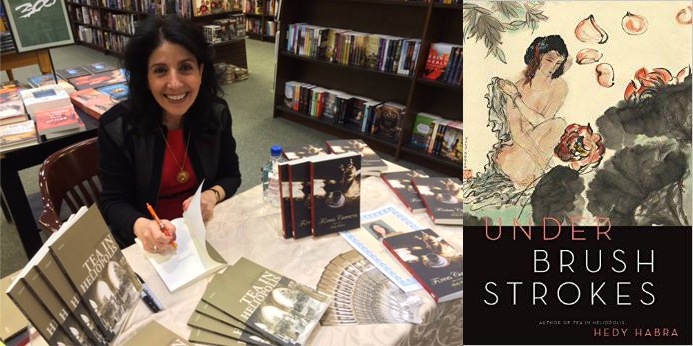On the left, photo of author Hedy Habra from Levure litteraire
Under Brush Strokes
By Hedy Habra
Press 53, 2015
In her “Under Brush Strokes,” Hedy Habra has created poems at once sensuous, frightening frightened, and so deeply immersed in the present that each moment appears like “a houseboat floating over a sea of foaming moss so thick/it seems anchored in green dunes despite its full-blown drift.” Her poems also harken to moments deeply reflective about the still-open doors of the past, where “we shall circle the human ruins, hand in hand, rest under/ the coolness of their elongated shadow.”
In “Obsessive Compulsion,” the opening poem, a woman stands before a magnifying mirror cutting split ends from her hair “like a huntress.” Her almost too-lucid imagination transforms the strands in her hands into “the intricacy of/parallel lines” where:
forking tips grow into
reeds, swelling into bamboo shoots painted in
Chinese ink over transparent rice paper through
which she sees her son falling from a cliff, light
as a clipping.
The powerful and transfiguring imagination can become vulnerable to the darkest of fears, chiseling them into a dreaded reality, one featuring: “his foot severed,” “his thick fragrant/blood an oddity in the night scented with/rosemary and lavender,” with “mountain lions, coyotes, a jugular vein prey to canines/sharper than shears.” Here, the woman holds the shears in her own hand, snipping and snipping as if to cleave in two this fear she has created, cutting obsession from compulsion, the “rigor mortis that would come so fast” from her simply finding “herself back in front of her bathroom mirror/. . . holding her breath, yes,/it was only an illusion.” Still, the knowledge of that illusion will not deliver her from herself, while “crisscross she aims [the split hairs and] tinkers with precision.”
A turn of the page will convey a quick sense of Habra’s emotional scope as a poet. In “The Apple of Granada,” she transforms the apple Eve gives to Adam into such a luscious pomegranate that it beggars the will to see it as just another piece of tempting fruit, with its “bejeweled/juicy garnets:”
the color of passion, hidden under its elastic pink skin
tight as an undersized glove, a fruit withholding the power to doom
and exile since the dawn of time.
No Biblical apple with its Judeo-Christian tradition of sin and hard-won redemption, instead, this luscious fruit represents an immersion to the limits of what the senses can feel and enjoy. The experience becomes its own cycle of “succumbing” and resurrection, where temptation hides no darkness of guilt and regret, but “reaches beyond” the corporeal boundaries of this world, an act of transubstantiation from body to pure spirit.
I mean, think of the
mystery hidden in its slippery gems, of the sweetness of the tongue
sealing the union with the beloved in the Song of Songs. And I
succumb, despite how messy it is to crack the fruits open, invade that
hive, oblivious to the indelible droplets splattering the sink, reaching
beyond the marble counter all over my arms and face, as my
fingertips delicately remove its inner membranes...
Here, we have witnessed the transcendent begetting, in retrospect, of a simple pleasure received from our mothers, and their mothers before them, the lesson of sweetening even the sweetest fruit: “I add a few drops of rose and orange blossom water.” This completes the union.
Habra’s “Under Brush Strokes” offers so finely woven a world of seemingly disparate images and longings, settings and resolutions, it easily deserves a respectful review commensurate to the spirit and sensibility that wrought from life the 86 pages of exquisite poetry embodied in this volume.
From the smithy of the artist’s soul come poems like “The Memory of Unspoken Words,” a title rich in its own irony, for how can we remember words we have never uttered? To paraphrase the great German philosopher Hans Gadamer, do we only live insofar as we can articulate our lives? This embodies the fear of any poet, a fear Habra objectifies in the concrete metaphor of an abandoned ship, adrift under “a metallic sky steeped in lavender”:
where angry clouds hover around the drowning sun suffused with
coral. Her pillow is a melted cloud filled with birds that forgot how
to fly, and now swim in a pool that overflows the deck, washing the
souls of dead sailors from every leak and corner.
Habra takes words that once had wings, and now, in their muted state, relegates them to swimming on the surface of the drowning pool. Still, they do not drown, precisely because of the use of this metaphor, which has the cleansing effect of washing the dead sailors overboard. For all her fear of a dawn “erasing with black ink/ her luminous shape,” this poet knows too that “the rainbow will/soon shine over a boat with discarded bags… of unspoken words.”
This article appeared in Al Jadid Magazine, Vol. 21, No. 72, 2017.
Copyright © 2017 AL JADID MAGAZINE

